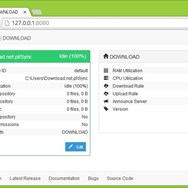Librevault vs Syncthing
Compare features, pricing, and capabilities to find which solution is best for your needs.

Librevault
Librevault is an open-source, zero-knowledge peer-to-peer file synchronization tool emphasizing privacy and security. It allows users to sync files directly between their devices without reliance on a central cloud server, ensuring data remains under user control and is protected by end-to-end encryption. by Alexander Shishenko

Syncthing
Syncthing is a free, open-source peer-to-peer file synchronization application that allows you to sync files between multiple devices in real-time. It is designed to be decentralized and replaces proprietary cloud services with a trusted, private network. by Jakob Borg
Comparison Summary
Librevault and Syncthing are both powerful solutions in their space. Librevault offers librevault is an open-source, zero-knowledge peer-to-peer file synchronization tool emphasizing privacy and security. it allows users to sync files directly between their devices without reliance on a central cloud server, ensuring data remains under user control and is protected by end-to-end encryption., while Syncthing provides syncthing is a free, open-source peer-to-peer file synchronization application that allows you to sync files between multiple devices in real-time. it is designed to be decentralized and replaces proprietary cloud services with a trusted, private network.. Compare their features and pricing to find the best match for your needs.
Pros & Cons Comparison

Librevault
Analysis & Comparison
Advantages
Limitations

Syncthing
Analysis & Comparison
Advantages
Limitations
Compare with Others
Explore more comparisons and alternatives













